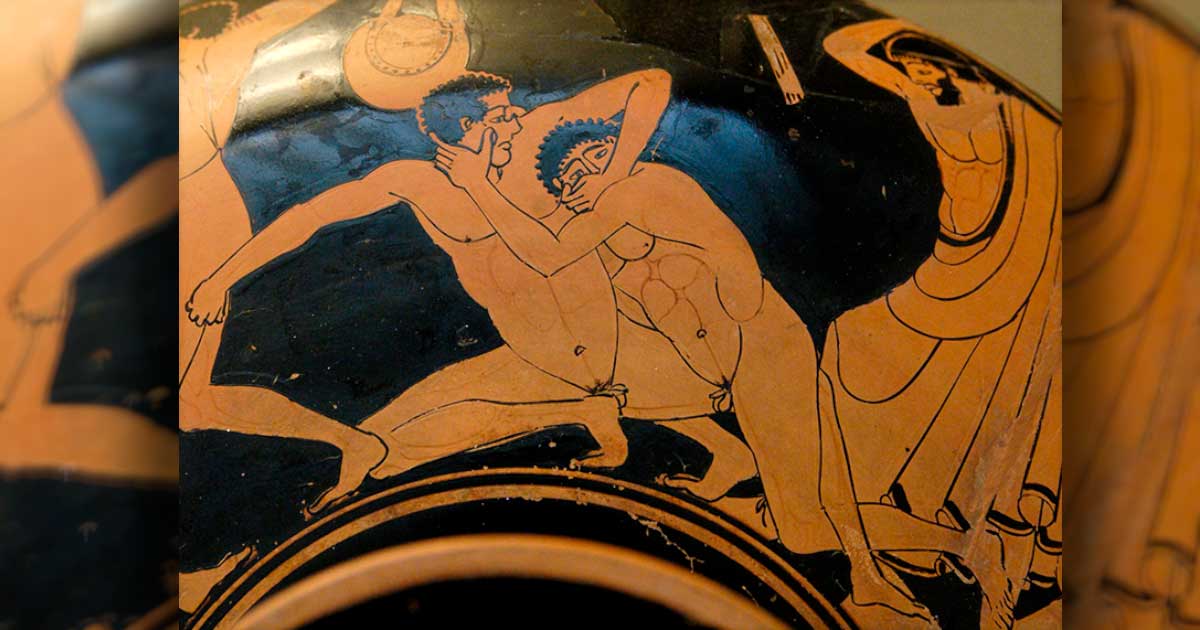Arrichion of Phigalia Won the Olympics When He Was Already Dead
One of the prerequisites for winning at the Olympics is to actually be alive. Or so I thought! The story of Arrichion of Phigalia, an Olympic wreath winner famed for his post-mortem victory, is one of the more peculiar sports stories to have survived the test of time. When defending his Olympic title for the third consecutive year, Arrichion was declared the winner only to discover he had departed the land of the living.
Pankration was a brutal barehanded sport which combined boxing and wrestling to create an ancient version of what is now known as mixed martial arts. In ancient Greece, the trio of wrestling, boxing and pankration were together known as the barea athla, meaning the “heavy events,” all of which were particularly popular at the time. Greeks actually believed that pankration had been invented by Theseus in his attempt to kill the Minotaur.
Known as pankratists, athletes used a range of techniques, including punching, kicking, striking, chocking, locking, genital twisting and throwing, in a sport I’m positive I would have found revolting to behold. The Greeks, however, loved pankration so much that it was added to the Olympic Games in 648 BC and champion pankratists were the celebrities of their time.

Replica of a Greek statue depicting a pankration fight. (MatthiasKabel / CC BY-SA 3.0)
The fights usually took a very long time, as there was no time limit, no rounds, no points, and the only rules were a prohibition on biting and eye gouging. Lovely. Fights only came to an end in three scenarios; knockout, death or if one of the athletes submitted, usually by raising his index finger in the midst of an excruciating hold. Referees armed with rods would prod fighters into action if they tried to get some rest in some part of the immense football field-sized arena.
Arrichion of Phigalia was a well-known figure in the pankration arena, having already won the Olympic wreath in both 572 and 568 BC. Nonetheless, during the 564 BC games Arrichion found himself in a choke hold. In a bold example of what the Greeks termed karteria, the idea of perseverance in the face of death or pain, Arrichion managed to dislocate his opponent’s ankle, forcing him to collapse to the floor and submit.
Unfortunately, Arrichion managed to break his own neck in the process, and when the referees pronounced him champion they discovered he was dead. In the end, his lifeless body was crowned with the Olympic wreath, while back home a statue was erected to celebrate his victory, now on display at the Museum of the Olympic Games in Olympia.
Top image: Arrichion of Phigalia was actually dead when he was declared the winner of the 564 BC Olympics after a pankration battle. The pankration scene on this kylix depicts a pankratists trying to gouge out his opponent’s eye. Source: Public domain
By Cecilia Bogaard




















Comments
https://www.etymonline.com/word/gymnasium
gymnasium (n.)
1590s, "place of exercise," from Latin gymnasium "school for gymnastics," from Greek gymnasion "public place where athletic exercises are practiced; gymnastics school," in plural, "bodily exercises," from gymnazein "to exercise or train," literally or figuratively, literally "to train naked," from gymnos "naked," from a metathesis of PIE *nogw-mo-, suffixed form of *nogw- "naked" (see naked).
A feature of all ancient Greek communities, at first it was merely an open space, later with extensive facilities and including training for the mind as well as the body.
Just understand that the true ancient Greeks had their ‘gymnasiums’ NOT for sport, but as a remnant of their golden age culture, to (in theory) venerate man as a ‘god’ on Earth, NOT a sportsman. In these ancient gymnasiums, men were NAKED, which gives the venue its name. Maybe they had rings and implements in their 'gyms', for stretching and other purposes of health and longevity, but sporting competition was NOT part of that. Sport had no purpose, as the young body became strong and beautiful through work such as all that required to live, simply and comfortably, to include the quarrying and construction of ancient stone-age cities and 'temples'. The sporting would likely come later, probably culturally forced upon the ancient Greeks by the brutal Romans, who used (essentially enslaved) the aboriginal people in many ways for their arguably EVIL intents and entertainment. Maybe there is still a lot of that permeated through modern culture. Maybe the ancient history of ‘the Olympics’, in its entirety, should be reconsidered.
Nobody gets paid to tell the truth.